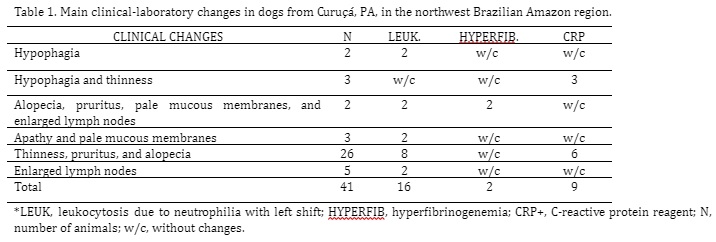Plasma fibrinogen and C-reactive protein in dogs
DOI:
https://doi.org/10.21708/avb.2023.17.3.11128Resumen
Complementary tests are essential for defining the diagnosis, prognosis, and treatment of diseases in animals. White blood count is the most common laboratory method for identifying and evaluating inflammatory processes in small animals. Therefore, this study aimed to evaluate plasma fibrinogen and C-reactive protein as supplementary tools for diagnosing inflammatory processes in dogs, correlating them with the results of the white blood count and the clinical condition of the animal. The sample size was calculated considering the estimated population of dogs living in the rural area of Curuçá, PA, Brazil. The sample included randomly selected healthy and unhealthy dogs. The animals underwent a clinical examination and complete blood count, fibrinogen, and C-reactive protein tests. Of a total of 149 animals, 17.4% (26/149) had hyperfibrinogenemia, 39.6% (59/149) were C-reactive protein positive, and 48.3% (72/149) had leukocytosis. Of the cases of leukocytosis, 63.8% (46/72) were due to neutrophilia. The analysis of the plasma protein: fibrinogen ratio in animals with hyperfibrinogenemia showed that the increased results were related to inflammatory processes in 84.6% (22/26) of these dogs. The results showed that fibrinogen and C-reactive protein are promising tools to identify inflammatory processes in dogs even before the presence of clinical signs; therefore, they are considered supplementary routine care methods to detect recent inflammatory processes not yet identified in the white blood count.
Descargas

Descargas
Publicado
Número
Sección
Licencia
Derechos de autor 2023 Acta Veterinaria Brasilica

Esta obra está bajo una licencia internacional Creative Commons Atribución 4.0.
Autores que publicam na Acta Veterinaria Brasilica concordam com os seguintes termos: a) Autores mantém os direitos autorais e concedem à revista o direito de primeira publicação, com o trabalho simultaneamente licenciado sob a Licença Creative Commons Attribution que permite o compartilhamento do trabalho com reconhecimento da autoria e publicação inicial nesta revista. b) Autores têm autorização para assumir contratos adicionais separadamente, para distribuição não-exclusiva da versão do trabalho publicada nesta revista (ex.: publicar em repositório institucional ou como capítulo de livro), com reconhecimento de autoria e publicação inicial nesta revista. c) Autores têm permissão e são estimulados a publicar e distribuir seu trabalho online (ex.: em repositórios institucionais ou na sua página pessoal) a qualquer ponto antes ou durante o processo editorial, já que isso pode gerar alterações produtivas, bem como aumentar o impacto e a citação do trabalho publicado (Veja O Efeito do Acesso Livre).


 Esta obra está licenciada com uma Licença
Esta obra está licenciada com uma Licença 